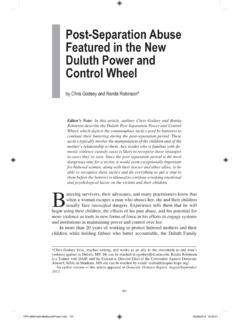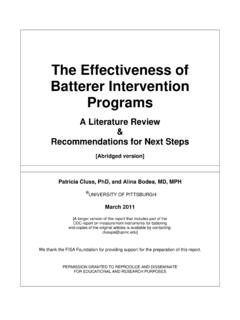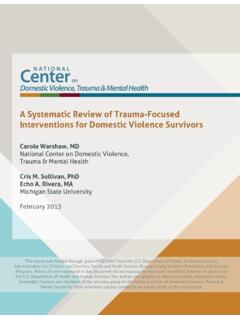Transcription of Minimum Standards For Domestic Violence Offender ...
1 Minimum Standards For Domestic Violence Offender Intervention programs Edition 2011-1 7/01/2011 1 TABLE OF CONTENTS Statement of Purpose 2 - 2 I. Required Standards A. Treatment Philosophy 3 - 4 B. Requirements of the Treatment Program 4 - 5 C. Mental Health/Substance Abuse/Chemical Dependency 5 - 5 D. Intake 5 - 6 E. Discharge Criteria 6 - 8 Compliance Discharge Administrative Discharge F. Evaluation 8 - 8 II. General Ethical Standards 8 - 9 III. Judicial System 9 - 9 IV. Required Contract Guidelines 10 - 11 V. Program Supervisor, Direct Service Provider & Trainee Requirements A. General Guidelines 11 - 12 B. Program Supervisor 12 - 12 C. Direct Service Provider 12 - 13 D.
2 Trainees 13 - 13 E. Continuing Education 13 - 13 VI. Procedures A. Application and Renewal 14 - 14 B. Notification 14 - 14 C. Monitoring 14 - 14 D. Appeal 14 - 14 E. Request for Inquiry 14 - 14 F. Revision of Standards 14 - 14 EFFECTIVE DATE July 1, 2011 2 STATEMENT OF PURPOSE Minimum Standards FOR Domestic Violence Offender INTERVENTION PROGRAM Idaho Code, Section 18-918, enacted in 1998, gave the Idaho Council on Domestic Violence and Victim Assistance (ICDVVA) responsibility to set Standards for counseling and treatment ordered for anyone who pleads guilty to or is found guilty of Domestic Violence . Idaho law uses the terms treatment or counseling ; however, current practice suggests that intervention is a more commonly used term and incorporates counseling as a component of treatment.
3 A list of programs meeting current Standards and approved by the ICDVVA, pertinent legislation, and application forms are available at: or call or Domestic Violence is generally accepted as a behavior of choice for which a person carries responsibility. Therefore, through intervention, one can learn to choose positive behavior. Thus, the goals of these Standards are to: 1. Increase victim safety; 2. Increase Offender accountability and positive, responsible behavior; 3. Help eliminate Domestic Violence through counseling, treatment, and education focused on the development of improved behavioral skills free of Violence ; 4. Promote healthy relationships; and 5. Foster and improve the climate of community response to Domestic Violence . Treatment integrating counseling, education, and other modalities shall be provided by those who have knowledge and understanding of the complex and intergenerational nature of Domestic Violence and are qualified through education and experience to provide appropriate and effective intervention.
4 Research and supporting literature were used in revising the Standards . The Council recognizes that these are Minimum Standards for treatment. The Council emphasizes that in order to be effective, programs shall integrate clinical expertise with the best available external evidence which includes, but is not limited to research. The expectation is that providers enhance practice, clinical effectiveness, and the delivery of services based on the awareness and knowledge of current evidence inclusive of research and related literature. Further, the expectation is to collaborate with representatives of victim service programs , the judicial system, and members of the community. The Committee for Oversight of Domestic Violence Offender Intervention programs and Standards (CODVOIPS) meets on a quarterly basis across the state to review new and renewal program applications, provide oversight for all approved programs , and to recommend amendments to the Standards for consideration by the Council.
5 3 I. Standards FOR Domestic Violence Offender INTERVENTION PROGRAM Domestic Violence Offender intervention programs shall be specifically designed to work with those who are court ordered to attend. Services may also be provided to those who elect to participate on a voluntary basis. The following describes the basic elements that should be included: A. Treatment Philosophy: 1. Defines Domestic Violence as any abusive, violent, coercive, forceful, or threatening act or word inflicted by one member of a family or a household member as defined in Idaho Code 18-918(a) on another along a broad spectrum of behavior from a one-time incident to a pattern of coercion that might include physical, emotional, psychological, verbal, sexual, or economic abuse or property damage; 2.
6 Clearly defines Domestic assault or battery as a crime; 3. Agrees with the principle that those who use Violence against a household member as defined in Idaho Code 18-918(a) must accept responsibility and consequence for their choice; 4. Supports a treatment plan with first priority to end abuse, and establish a basis for safety; 5. Promotes changing attitudes toward intimate partners and other family members and Violence in the family; 6. Recognizes that Domestic Violence has multiple causative and contributing factors; 7. Recognizes that the conduct of a victim does not excuse the choice to use Violence by the Offender ; 8. Recognizes that Domestic Violence is complex and requires on-going comprehensive assessment for effective intervention; 9.
7 Recognizes that substance abuse, anger management, and mental health treatment are not substitutes for Domestic Violence Offender intervention though they may be necessary components of successful recovery; 10. Recognizes that the intervention must be based on the assessment of the Offender and the nature of Violence ; and 4 11. Recognizes the decision of a family to remain together as a valid choice if safety is a first priority and mutual respect a primary value. Further recognizes that family involvement in recovery may eventually be necessary for long-term success. B. Requirements of the Treatment Program: 1. The primary goals of Domestic Violence Offender intervention are changed attitudes and behaviors resulting in increased victim safety and cessation of abusive conduct.
8 The ICDVVA recognizes that Domestic Violence Offender intervention is an evolving field, where new and promising developments are being explored. However, victim and community safety should guide the systemic responses to Domestic Violence . Thus, whenever the needs of Domestic Violence offenders in treatment are likely to conflict with victim and/or community safety, victim and/or community safety must take precedence. 2. Intervention shall be provided by an approved provider. All Program Supervisors and Direct Service Providers must stay current on research and supporting literature regarding family Violence and obtain continuing education. All Program Supervisors and Direct Service Providers must be able to demonstrate application of current evidence-based research and professional literature related to effective program delivery and evaluation.
9 3. Initial intervention shall be standard Offender group counseling, education, and/or treatment for a Minimum of 52 ninety-minute sessions. a. Careful on-going assessment by the treatment staff of the circumstances of each case will be necessary to determine and implement intervention plan. b. Documentation must be maintained in each case of the determination of treatment plan and Offender progress, including sessions attended. c. The CODVOIPS recommends that during the intake process, treatment staff obtain copies of the evaluation completed by an Idaho Supreme Court approved evaluator if available and police reports including supplemental risk assessment. 1 4. If subsequent to implementing the initial intervention, the treatment provider and officers of the court determine by thorough assessment and evaluation it is appropriate and necessary, CODVOIPS approved, individual intervention or other interventions appropriate to the culture, community, and family may be implemented, however, other interventions shall not include couples/conjoint intervention.
10 Documentation of assessment and evaluation should demonstrate at a Minimum that the alternative plan includes and supports the victim s safety and accountability of the Offender . 5. An intake session is not considered a treatment session. 1 Items denoted in italicized print are guidelines and not requirements 5 6. All sessions that are attended must be documented by the treatment staff. A sign-in sheet is 7. In the case of group intervention, group size shall not exceed twelve individuals. A second facilitator is recommended if group size exceeds eight 8. Content areas in any treatment modality will include at a Minimum : a. Personal accountability; b. Social, cultural, and familial foundations of Domestic Violence and abuse; c. Role of family and others in addressing long term patterns of Violence ; d.










